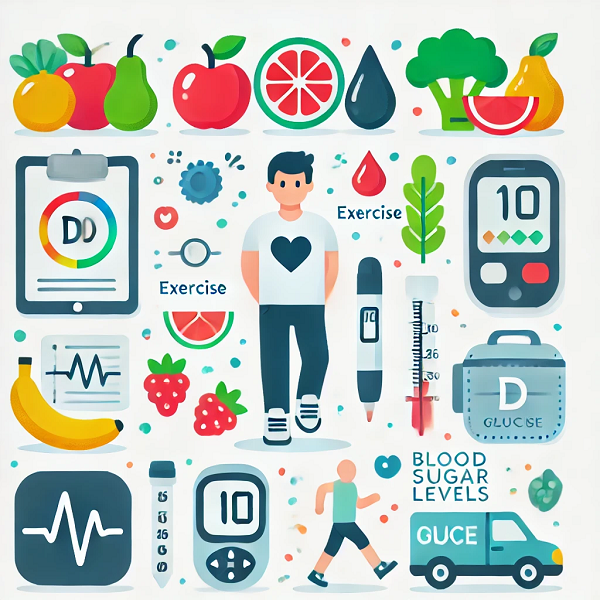Living with diabetes means managing a delicate balance of blood sugar levels, medication, and lifestyle choices. Weight management plays a crucial role in this equation, influencing both the onset and progression of diabetes. As someone who understands these challenges firsthand, I’m here to delve deeper into how diabetes and weight loss are interconnected, offering practical advice and insights.
Understanding the Connection
Type 2 diabetes is often associated with obesity and excess weight. When we carry extra weight, especially around the abdomen, our cells become more resistant to insulin. This insulin resistance makes it harder for glucose to enter cells, leading to elevated blood sugar levels. Over time, these high blood sugar levels can damage organs and increase the risk of complications such as heart disease, stroke, and nerve damage.
Losing weight, particularly abdominal fat, improves insulin sensitivity. This means your body can use insulin more effectively to regulate blood sugar levels. Even modest weight loss—around 5% to 10% of your body weight—can have significant health benefits for people with diabetes, including improved glucose control and reduced reliance on medication.
Healthy Eating Habits
A balanced diet is fundamental to managing diabetes and achieving weight loss goals. Here are some key principles to consider:
- Focus on Nutrient-Dense Foods: Fill your plate with vegetables, fruits, lean proteins (such as poultry, fish, and legumes), whole grains (like brown rice and quinoa), and healthy fats (such as avocados and nuts). These foods provide essential nutrients without causing rapid spikes in blood sugar levels.
- Monitor Carbohydrate Intake: Carbohydrates directly impact blood sugar levels, so monitoring and moderating your intake is essential. Choose complex carbohydrates that are high in fiber and low in refined sugars. Portion control is crucial; aim for consistent carbohydrate intake throughout the day to help stabilize blood sugar levels.
- Practice Mindful Eating: Pay attention to your body’s hunger and fullness cues. Eating slowly and savoring each bite can help prevent overeating. Avoid distractions, like watching TV or scrolling through your phone, while eating to stay in tune with your food choices.
- Stay Hydrated: Drinking plenty of water helps maintain hydration and supports overall health. Limit sugary beverages and opt for water or unsweetened herbal teas instead.
The Role of Exercise
Regular physical activity is a powerful tool for managing diabetes and achieving weight loss. Exercise helps lower blood sugar levels by increasing insulin sensitivity and improving muscle glucose uptake. Here are some tips to incorporate exercise into your routine:
- Aim for Variety: Include aerobic exercises (such as brisk walking, cycling, or swimming) and strength training (like weightlifting or resistance bands) in your weekly routine. Aerobic exercise improves cardiovascular health, while strength training helps build muscle mass and boosts metabolism.
- Set Realistic Goals: Start with manageable goals and gradually increase the duration and intensity of your workouts. According to health guidelines, aim for at least 150 minutes of moderate-intensity aerobic activity per week, spread out over several days.
- Stay Active Throughout the Day: Incorporate movement into your daily life by taking the stairs instead of the elevator, parking farther away from your destination, or taking short walking breaks during the day.
Seeking Support
Managing diabetes and weight loss can feel overwhelming at times, but you don’t have to do it alone. Seek support from healthcare professionals, registered dietitians, certified diabetes educators, or support groups. They can provide personalized guidance, monitor your progress, and encourage you.
Setting Realistic Goals
Setting achievable goals is key to sustaining long-term success. Rather than focusing solely on weight loss, prioritize improving your overall health and well-being. Celebrate small victories, such as improving blood sugar control, increasing your daily activity level, or making healthier food choices.
Navigating diabetes and weight loss requires dedication, patience, and a proactive approach to self-care. By adopting a balanced diet, staying physically active, and seeking support when needed, you can effectively manage your diabetes while working towards your weight loss goals. Remember, every positive step you take towards a healthier lifestyle contributes to better diabetes management and overall well-being.
Additional References:
Weight Loss With Diabetes: The Magic Number for Better Blood Sugar
Mayo Clinic: How lifestyle, daily routine affect blood sugar
Eating Well & Managing Diabetes
NIH: The Role of Exercise in Diabetes
#DiabetesAwarenes #WeightManagement #Type2Diabetes #InsulinSensitivity #HealthyEating #NutrientDense #CarbControl #MindfulEating #StayHydrated #ExerciseForHealth #AerobicExercise #StrengthTraining #FitnessGoals #SupportForDiabete #HealthcareSupport #SetRealisticGoals #HealthyLifestyle #WellnessJourney







Your posts are always so informative.
Thank for your comment(s). For additional info, feel free to follow us.